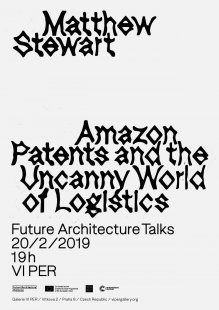
Matthew Stewart: Amazon Patents and the Uncanny World of Logistics (Future Architecture Talks)
Since 2010, Amazon Technologies Inc. has filed for 5,860 patents, ranging from drones controlled by distribution centers and mobile robotic warehouses, to furniture with augmented reality, inflatable data centers, underwater and flying warehouses, and endless on-demand clothing production, automated shopping with image recognition systems, and ubiquitous delivery of goods by drones.
The lecture will discuss the context of this building of a “world” as an example of platform capitalism, in which Amazon seeks control over digital and physical infrastructure that far exceeds its beginnings in e-commerce and now includes stores, home automation, data centers, machine learning technologies, and shipping and freight operations.
By examining Amazon's logistics division in the context of the exhibition Logistic Landscape at Gallery VI PER, a broader network and strategies that Amazon employs for delivering goods across Europe will be elaborated. Based on examples from Amazon's latest logistics patent documents, the lecture will address the various spatial scales at which Amazon currently operates, from a 1 km long semi-automated distribution center to wearable technology used for monitoring workers. Stewart will thus clarify Amazon's obsession with organization and productivity in the context of Taylorist management theory, updated for abstract users, measured in data, and driven by algorithms.
Matthew Stewart is a researcher and architect from London who is interested in the spatial manifestations of our developing data economy. His work aims to document both abstract and everyday spaces defined by data technologies, explored through writing, exhibitions, and critiques for designers. His latest project, the Patent Infringement Institute, was commissioned by Het Nieuwe Instituut for the Dutch pavilion at the 2018 Venice Architecture Biennale. Matthew is a contributor to the online research collective Failed Architecture and teaches architecture at the University of Westminster.
The lecture will discuss the context of this building of a “world” as an example of platform capitalism, in which Amazon seeks control over digital and physical infrastructure that far exceeds its beginnings in e-commerce and now includes stores, home automation, data centers, machine learning technologies, and shipping and freight operations.
By examining Amazon's logistics division in the context of the exhibition Logistic Landscape at Gallery VI PER, a broader network and strategies that Amazon employs for delivering goods across Europe will be elaborated. Based on examples from Amazon's latest logistics patent documents, the lecture will address the various spatial scales at which Amazon currently operates, from a 1 km long semi-automated distribution center to wearable technology used for monitoring workers. Stewart will thus clarify Amazon's obsession with organization and productivity in the context of Taylorist management theory, updated for abstract users, measured in data, and driven by algorithms.
Matthew Stewart is a researcher and architect from London who is interested in the spatial manifestations of our developing data economy. His work aims to document both abstract and everyday spaces defined by data technologies, explored through writing, exhibitions, and critiques for designers. His latest project, the Patent Infringement Institute, was commissioned by Het Nieuwe Instituut for the Dutch pavilion at the 2018 Venice Architecture Biennale. Matthew is a contributor to the online research collective Failed Architecture and teaches architecture at the University of Westminster.
The English translation is powered by AI tool. Switch to Czech to view the original text source.

0 comments
add comment










